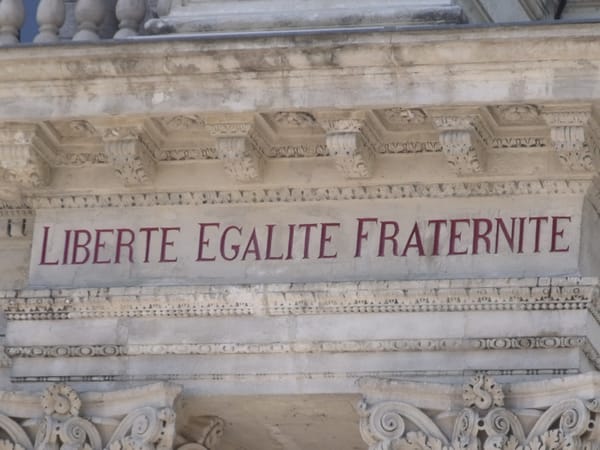Enlightenment Noise

Steven Pinker recently penned a piece reflecting on all the noise surrounding his recent book, Enlightenment Now. He says,
You wouldn’t think that a defense of reason, science, and humanism would be particularly controversial in an era in which those ideals would seem to need all the help they can get… Far from embracing the beleaguered ideals of the Enlightenment, critics have blamed it for racism, imperialism, existential threats, and epidemics of loneliness, depression, and suicide. They have insisted that human progress can only be an illusion of cherry-picked data.
Categorizing Pinker’s book is difficult. On the one hand, it itself is a cherry-picked narrative. As many critics have pointed out, no mention of Hume is just one of the fairly glaring, if predictable omissions. But the common complaint, mentioned above, is that Pinker just got the Enlightenment wrong. I agree with Pinker that “it’s pointless to quibble with the word [‘Enlightenment’] because the ideals were not endorsed in the same way by every last writer of the era.” “Why not Hume?” is a question implying Pinker should have written a different book, perhaps one more to the critic’s liking. Pinker’s project is simultaneously more modest and more grand than trying to get the Enlightenment exactly right. John Gray is probably right to point out that it’s more of a sermon than a work of intellectual history; “a therapeutic manual for rattled rationalists” and liberals who need reassurance that they are indeed on the right side of history.
But still, critics charge that Pinker’s work is far too ahistorical to be taken seriously at all, even as a sermon (and it’s not clear Pinker would be okay with putting his work in the sermon category anyway). They claim that ignoring the racism, sexism, and imperialism of the Enlightenment is inexcusable. Yet what critics don’t seem to understand—perhaps because they don’t want to understand—is that defenders of the Enlightenment can deploy a rather simple counter, and indeed Pinker does: “Each of these crimes is as old as civilization,” Pinker says, “and it was only during the Enlightenment that people singled them out as moral blights and sought to eliminate them from the human condition.” Arguing that the Enlightenment was the first time people sought to eliminate our moral blights is a bit off the mark, but the spirit remains: saying “you forgot to talk about racism” is like saying “you forgot to talk about feet.”
Read in the most charitable light, Pinker’s book and recent reflection is simply a defense of certain values, values he thinks can be attributed to some reading of the Enlightenment. But reason, science, and humanism didn’t survive unscathed from the Enlightenment; indeed, one thing some critics get right is that a more nuanced take of the Enlightenment might show how these values barely survived the Enlightenment unscathed and unharmed. A refusal to include insights from not only the counter-Enlightenment but recent work in history and sociology as well as 20th century intellectual movements like pragmatism, feminism, and yes, even postmodernism strikes many readers as a colossal oversight. Whether or not one agrees with these recent developments must be bore out in argument, not brisk and self-assured dismissal.
The oversight can be seen more clearly from another piece written for Quillette—where Pinker published his recent musings, and which has filled a corner of the Internet with related arguments—by one of its editors Jonathan Kay entitled “Social Justice Is Popular. But the Rule of Law Is Sacrosanct.” In it, Kay sounds the familiar Enlightenment-inspired themes: “Due process knows no colour. It knows no gender. It knows no hashtags”; or “in the long run … the rule of law—if faithfully applied, without favour or corruption—can build the social trust that is the true bedrock of social justice”; or truth emerges from “clear-eyed scrutiny and open debate, not blinkered loyalty to one narrative, even if that narrative is coded in the appealing language of social justice.” Kay leaves the reader with one last aphoristic piece of advice to chew on. “[A] great lawyer,” he says, “doesn’t just protect people. She protects principles.”
But when, we might ask, has the law ever had no color, no gender, or been unblinkered by prejudice, bias, racism, or narrative? Who is the most clear-eyed regarding our deepest and most complex social problems? What could “debate” possibly mean when, for most of our history, most people were left out of the debate? And what are we supposed to make of the distinction between protecting people and principles?
The problem with many of these odes to the Enlightenment is that, as I mentioned earlier, they ignore mountains of recent literature, notably those of pragmatist and feminist thought. Recent historical literature has a place in this story as well, but I think that in many ways recent work in history stems from the insights that pragmatism and feminism offered in the 20th century.
“Consider what effects, that might conceivably have practical bearings, we conceive the object of our conception to have. Then, our conception of these effects is the whole of our conception of the object,” Charles Peirce wrote. In less jargon, consider what a word, institution, practice, or norm means in practice, in our everyday lives, and that is what it means—plain and simple. There is no meaning of something outside of its use in social situations; if there is one, the pragmatist asks with a slight smirk, please be so kind as to point it out. John Dewey took this line and ran with it, applying it to ethics and politics, shifting our focus from the dead-end analysis of meanings in the abstract and highly theoretical realm toward what one might with only some hesitation call a sociological-historical view. What mattered was not what words like freedom, law, or justice actually, objectively meant, viewed from some true-across-all-times-and-places standpoint, but rather how these words and concepts were used and employed on the ground by actual people in actual situations. Insofar as essences are interesting to the pragmatist they are as contingent historical artifacts.
“It is significant,” Dewey writes, “that human nature was taken to be strongly moved by inherent love of freedom at the time when there was a struggle for representative government; that the motive of self-interest appeared when conditions in England enlarged the role of money, because of new methods of industrial production…” We are the product of our situations, we cannot escape our context or get jump outside our skin to view ourselves, our ideals, and values objectively; so too with the language we use to describe and understand our situation. Reasoning is always the reasoning of someone or some group bound to some particular circumstance.
Feminists arrived at very much the same insight but interestingly enough not through pragmatism. For most of the 20th century pragmatism lay dormant, nudged out by positivism. As Charlene Haddock Seigfried writes: “The pragmatists’ position that human knowledge always instantiates particular perspectives, including values, ran strongly counter to the rising tide of positivist ideology espousing the neutrality of science and the objectivity of pure observation.” If the Enlightenment preached universalism, pragmatism preached particularism.
But Siegfried rightly sees a connection between the insights of pragmatism and feminism, some of which are
a penchant for indirect, metaphorical discourse rather than a deductive and reductively symbolic one, the concreteness of pragmatist methodology, philosophizing out of one’s own experience and everyday problems, the priority of human relations and actual experiences over abstract conceptual distinctions, shared understanding and communal problem-solving rather than rationally forced conclusions as the goal of philosophical discourse, the valuing of inclusiveness and community over exaggerated claims of autonomy and detachment, and developmental rather than rule-governed ethics.
In some stories, the stories I think Pinker and Kay tell, the Enlightenment gave us more than a particular perspective; it gave us a universal one. But to pragmatists and feminists the Enlightenment preached a highly particular—some might say highly male—worldview that prized “detachment, autonomy, and a clear sense of boundaries between self and world, self and others” which resulted “in our male-dominated intellectual traditions, in the fetishization of detachment and ‘objectivity’ in ethical reasoning and scientific rationality.” In the same vein, Dewey thought that many Enlightenment theorists, notably the social contract theorists, started with a particular value like property rights or individual rights and reasoned backward. In other words, they arrived at a conclusion—a conclusion that Dewey didn’t necessarily disagree with—and then groped around for reasons and principles in order to make it look as if their first principles and ultimate values were the product of sound reasoning rather than its starting point.
Recent work in history and sociology is the second prong in this one-two punch to Enlightenment values. Books like The Color of Law, The Color of Money, or even Gunfight: The Battle Over the Right to Bear Arms in America all recount stories about how the law, the world of finance and banking, and gun rights (respectively) have played out in the lives of actual people, especially minorities. It’s irresponsible to tell a history of gun rights—a right based on a supposedly universal principle of self-defense and which the NRA has fought for allegedly without prejudice—without also mentioning the fact that when blacks started carrying guns to protect themselves, whites, with the intellectual and financial support of the NRA, started to look at this “absolute right” askance.
These sociologies and histories prize context over abstract words like reason, science, and humanism that do little to no work in pointing us in any particular direction or in deciding what to do or what policy to pursue in any given situation. Words we can interrogate with simple questions like “Whose reason?” They are, in short, empty. And when we begin to do the work of filling them in—with these stories and histories—they begin to look not only unhelpful, but rather flimsy.
So too with principle. If Stanley Fish is right to point out that principles are best thought of as shorthand abridgements of past, albeit useful, behavior, then commitment to principle as a guide for action is not only misleading and unhelpful but potentially dangerous. If in practice principles are little more than post hoc justifications for one’s actions—things we look for after the fact to make our judgments seem more noble and less arbitrary—then to flip the script around and let principle determine one’s actions prevents us from doing the hard work of reasoning.
Fish sees a divide in political theory on precisely this point. “On the one side,” he says, “is the man of principle for whom a formal contract must be kept irrespective of the moral status of the other party… On the other side is the man who varies his obligations according to the moral worth of the persons he encounters; some people have a call on your integrity, others don’t, and the important thing is to determine at every moment which is which.” Fish likens the first half of this divide with those who speak in “accents of Enlightenment liberalism”—the likes of Pinker and Kay. Here we are supposed to set aside our “local affiliations” and “partisan goals” and enter a “forum in which out allegiances are not to persons or to wished-for outcomes but to abstract norms that neither respect nor disrespect particular persons and are indifferent to outcomes.”
Fish thinks this is all hogwash. It’s impossible, he says, to define “abstractions like fairness, impartiality, mutual respect, and reasonableness” without respect “to any particular agenda.” The insight, not new to Fish, is that any attempt to define any one of these abstractions will proceed from some substantive and unexamined vision about “the way life should be.” It is this unexamined vision, with all its unexamined assumptions, “that will really be generating the conclusions that are supposedly being generated by the logic of principle.” Unbiased, neutral, impartial—all nonsense.
Fish’s main point is that everyone brings substantive commitments to the table, and when people praise principle they are really praising a specific vision, one that interprets principles in a particular and far from neutral way. But even if someone does manage to stumble upon a neutral principle, Fish says, “[it] wouldn’t get you anywhere in particular because it would get you anywhere.” If it is sufficiently neutral, it will also be sufficiently general and unhelpful in guiding any specific action.
The divide between people who value principle and neutrality and those who don’t can be put another way: between those who want to ask, “What is its essence?” and those following a pragmatist-feminist-Foucauldian line who ask, “Where did it come from?” The first group empties all principle—nondiscrimination, fairness, The Law, etc.—of its history; the second shows how certain principles arrived on the scene “from a set of historical circumstances to which it was a response.” Fish uses the example of nondiscrimination. Nondiscrimination wasn’t the name for some abstract, a priori principle; it was rather a practice that was a response to another practice: discrimination. Fish says that it is only when adherents to the new practice start to think of themselves as doing “the Lord’s work” that it becomes possible to start thinking of nondiscrimination in “formal” terms. That is, as “an absolute and pre-existing imperative.”
It would take entirely too long to recount all the ways in which law—the institution, perhaps only second to science, most people think of as the least arbitrary, most objective, and based on sound principles and reasoning—has explicitly recognized some color or gender, or been applied with “favour or corruption.” But this blow is far from damning, as many “defenders” of Enlightenment values assume. Where the Pinkers of the world go wrong is when they begin to think criticisms of the Enlightenment project, of objectivity and reason, lead one straight to its opposite, relativism or irrationalism—and of course, then the end of civilization.
But pragmatism, feminism, and hermeneutics are far from advocates of relativism; nor are they against reason or science, whatever that might even mean. What they are against, to drive the point home, is one particular understanding of reason or science, rationality and agency, mind and world. If we take these traditions honestly and with open arms, as I think we should, we see that they offer us modifications to the Enlightenment project, not wholesale criticisms. As Robert Brandom says,
The pragmatists always thought of themselves as offering friendly amendments in support of the basic philosophical mission of rethinking inherited ideas of rationality, understanding, agency, and self, in the light of the very best contemporary scientific understanding of the natural world.
So too with feminists, postmodernists, and those of a more hermeneutic persuasion. These movements were less a radical break from Enlightenment themes than engaged in a productive conversation with them. That subtle shift, that it was more of a conversation than an argument, frees one from the throes of Manichean thinking—and if not that, at least from the idea that we are always on the brink of civilizational disaster, with one side clearly not seeing the dangerous implications of the ideas they put out into the world.
But what, we might ask, do all these arguments about the Enlightenment come down to? Pedantic academic bickering and infighting? Perhaps something more. What Pinker gets right in spirit if not in word is that arguments about our past and its traditions are, as Richard Rorty said, usually just arguments over “which hopes to allow ourselves and which to forgo.” Charges of being ahistorical might have their place, but one can read Pinker as essentially arguing for certain hopes—hopes centered around the primacy of reason, humanism, and the scientific attitude. What Rorty said of our national past might equally be applied to the Enlightenment:
Nobody knows what it would be like to try to be objective when attempting to decide what one’s country really is, what its history really means, any more than when answering the question of who one really is oneself, what one’s individual past really adds up to.




